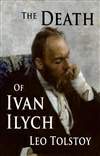The Death of Ivan Ilych
作者: Leo Tolstoy 标签: 英文短篇小说 进入英语论坛The Death of Ivan Ilyich (Russian: Смерть Ивана Ильича, Smert' Ivana Ilyicha), first published in 1886, is a novella by Leo Tolstoy, one of the masterpieces of his late fiction, ...
The Death of Ivan Ilyich (Russian: Смерть Ивана Ильича, Smert' Ivana Ilyicha), first published in 1886, is a novella by Leo Tolstoy, one of the masterpieces of his late fiction, written shortly after his conversion to Christianity.
The novel tells the story of the life and death, at the age of 45, of a high court judge in 19th-century Russia—a miserable husband, proud father, and upwardly-mobile member of Russia's professional class, the object of Tolstoy's unremitting satire. Living what seems to be a good life, his dreadful relationship with his wife notwithstanding, Ivan Ilyich Golovin bangs his side while putting up curtains in a new apartment intended to reflect his family's superior status in society. Within weeks, he has developed a strange taste in his mouth and a pain that will not go away. Numerous expensive doctors—friends of friends of friends—are visited in their surgeries or called to the judge's bedside, but beyond muttering about blind gut and floating kidneys, they can neither explain nor treat his condition, and it soon becomes clear that Ivan Ilyich is dying.
The second half of the novel records his terror as he battles with the idea of his own death. "I have been here. Now I am going there. Where? ... No, I won't have it!" Oppressed by the length of the process, his wife, daughter, and colleagues—even the physicians—decide not to speak of it, but advise him to stay calm and follow doctor's orders, leaving him to wrestle with how this terrible thing could befall a man who has lived so well.
He spends his last three days screaming. He realizes he is "done for, there was no way back, the end was here, the absolute end ..." One hour before his death, in a moment of clarity, he sees that he has lived only for himself. After months of dwelling on his own anguish, he suddenly feels pity for the people he's leaving behind, and hopes his death will set them free. With that thought, his pain disappears. He hears someone say, "He's gone." He whispers to himself, "Death has gone," and draws his last breath.




